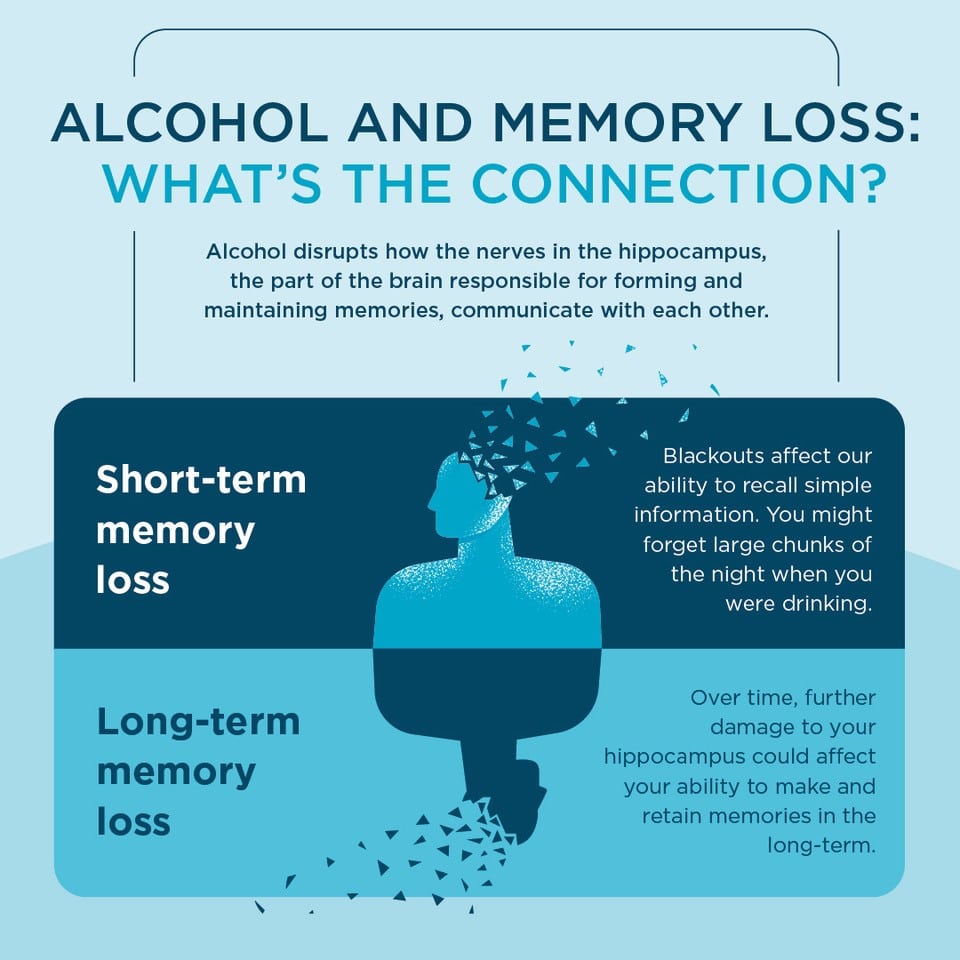Alcohol blackouts: memory loss after drinking
Alcohol can affect both your short-term and long-term memory. However, there are a number of things you can do when drinking, to help to avoid memory loss.
Alcohol can affect both your short-term and long-term memory. However, there are a number of things you can do when drinking, to help to avoid memory loss.



Have you ever had a night of drinking followed by a morning where you can’t recall large parts of what happened? It’s not unusual for people to have a hazy memory after a night of heavy drinking. These are examples of blackouts, or more generally, how alcohol and memory loss are linked.
Alcohol can have a negative effect on your memory, both in the short and long-term. This article explains what you can do to minimise this impact.
Alcohol can affect our ability to create new memories, which is how alcohol can cause blackouts. You might hear this described as being "blackout drunk".
During a blackout, you’ll usually be able to function relatively normally. You’ll still be able to walk, talk and participate in the rest of the evening. You just won't be able to form new memories.When you wake up, it’s likely that you won't remember much of the time that passed the night before. It might feel like that part of your memory has been wiped.
It’s important to understand that blackouts aren’t the same as passing out. When someone passes out, they’ve consumed so much alcohol that they’ve fallen asleep or become unconscious.
Blackouts can vary in intensity, but even after only a few drinks, your ability to recall relatively simple information can be reduced. They can be as minor as forgetting someone's name or where you put your keys. They can also be as severe as being unable to recall a large chunk of time or an entire night.
Blackouts happen because of the way alcohol interacts with our brain. It disrupts how the nerves in the hippocampus communicate with each other. The hippocampus is the part of the brain that’s responsible for forming and maintaining memories. If the activity in your hippocampus slows down, so too will your ability to remember things during that time.
Heavy drinking over time has many negative effects on the body, including further damage to your ability to make and retain memories over a longer period of time
People who struggle with alcoholism often lack vitamin B1, which is thought to be the cause of Wernicke-Korsakoff Syndrome (WKS). WKS is a brain and memory disorder, that’s common among people with alcohol addictions. WKS leads to structural changes to your brain, which can cause gaps in your memory.

Alcohol impacts our inhibitions, thoughts, behaviours and abilities in all kinds of ways. This includes things like our speech, reactions and ability to walk. This usually happens because alcohol causes disruption in the hippocampus, the part of your brain that’s responsible for creating new memories. Alcohol interferes with the activity in your brain, making it harder for your brain to take in new experiences, thoughts, or facts and turn them into memories.
Other factors can also contribute to memory loss after drinking, including vitamin B1 (thiamine) deficiency, poor sleep, and neurotoxicity — the shrinkage or damage to brain tissue that can occur after long-term heavy alcohol use.
There are many potential scenarios that may indicate you’ve experienced a blackout. The morning after drinking, have you:
For most people, their issues with short-term memory loss will only be temporary. However, if you’re having regular memory issues after consuming alcohol, this could be a sign you have a drinking problem.
You’re at risk of developing long-term health issues if you drink so much alcohol that you have blackouts. Regularly drinking this much isn't safe.
Heavy drinking, also known as binge drinking, can have long-term effects on almost every system in your body. It may increase your risk of liver damage, various types of cancer, high blood pressure and even brain damage.
Alcohol can also have a damaging effect on your mental health. For example, the connection between alcohol and depression is well-established. Around 60% of people in treatment for alcohol addiction are also treated for mental health difficulties.
Blackouts, or some level of memory loss immediately after a heavy drinking session, are not uncommon. A 2016 study found that half of all drinkers will experience alcohol-related memory problems at some point in their lives. The study was published in the Alcoholism, Clinical and Experimental Research journal. Given that as few as four or five alcoholic drinks can lead to blackouts (as stated by the National Institute on Alcohol Abuse and Alcoholism), it’s no surprise that many people have experienced them at some point.
Lots of people can drink moderately without causing damage to their memory in the long term. However, if you’re exceeding the UK’s recommended weekly alcohol intake of 14 units, and you’re worried it’s affecting your memory, then it’s important that you try to cut down.
To avoid blackouts caused by alcohol, you can try these tips for drinking less when you’re out socialising:
More generally, reducing your alcohol intake will help to keep your brain and memory functioning as well as possible. Try these strategies for cutting down:
At Priory, we provide outstanding treatment for alcohol addiction throughout our network of UK rehab centres. If you’re experiencing regular blackouts that are damaging your life and relationships with loved ones, it might be time to reach out to us for extra support.
Use the information below to get in touch with Priory’s team and book a free, no-obligation addiction assessment.
